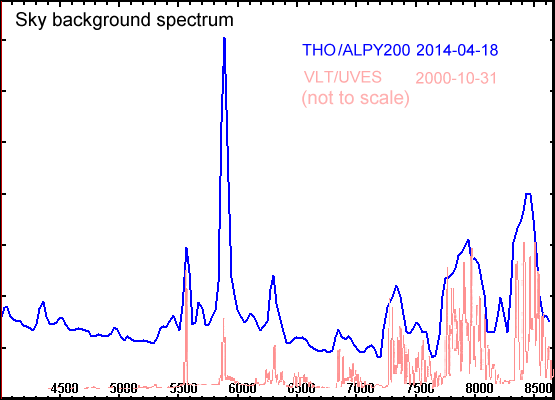› Forums › Spectroscopy › Light pollution
- This topic has 4 replies, 3 voices, and was last updated 8 years, 8 months ago by
 Paul Luckas.
Paul Luckas.
-
AuthorPosts
-
27 May 2017 at 12:03 pm #573758
 Paul LuckasParticipant
Paul LuckasParticipantI thought it would be interesting (if slightly pessimistic) to compare our light pollution via spectra. Here’s mine – a screen shot of a raw 600 second exposure of the Nova in Centaurus and, sadly, my worsening skies. Thank goodness background subtraction works as well as it does.
Paul
Attachments:
27 May 2017 at 2:38 pm #578237 Ernst PollmannParticipant
Ernst PollmannParticipantDear Paul,
that’s a fantastic example in order to use it in my regular spectroscopic seminars at the University of the city of Wuppertal here. Mostly seminars for beginners. Is it possible to get the fits file?
I would like to scan the sky and the spectrum separately in order to show the emissions of the sky within the spectra itself and how important the subtraction is.Best wishes, Ernst
27 May 2017 at 3:02 pm #578239 Robin LeadbeaterParticipant
Robin LeadbeaterParticipantPaul,
The relatively low level of the Na D line in your spectrum is interesting (The narrow band from LP sodium lighting still dominates in my spectrum) Is this not used in your area at all these days ?
Robin
27 May 2017 at 3:05 pm #578238 Robin LeadbeaterParticipant
Robin LeadbeaterParticipantHi Paul,
Here’s mine with the ALPY 200 from my reasonably dark rural site, from this poster paper
http://www.threehillsobservatory.co.uk/astro/spectroscopy_20.htm

The comparison with the VLT was interesting. (note the high natural pollution from OH band emission in the IR)
It has certainly become worse over the years in quantity and complexity though with a shift locally from LP sodium to a mix of HP sodium, metal halide and now LED, particularly the ones high in blue. Sky background subtraction does indeed work very well eg as here where the signal is much lower than the sky background (It still adds noise though and I think is ultimately limiting my sensitivity)
http://www.threehillsobservatory.co.uk/astro/spectra_46.htm
Cheers
Robin
27 May 2017 at 4:59 pm #578241 Paul LuckasParticipant
Paul LuckasParticipantI could be wrong, but I think they’ve been gradually replacing sodium and/or mercury vapour street lighting with some other fluorescent variant over the last few years (not LED as far as I know). No doubt to save money, not light pollution.
Speaking of LED, I’ve just replaced a number of old ceiling mounted halogen interior down lights with LED versions due to some safety concerns with the old technology in my house. As my backyard observatory is very near our living room I’ve wondered if I’m seeing the effects of this appear in my background (must dig out some old files to check).
Ernst – I’ll happily email you that FITs file.
Paul
-
AuthorPosts
- You must be logged in to reply to this topic.

